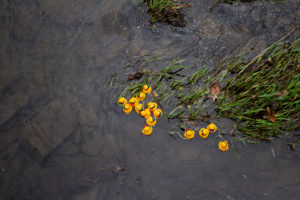On a dreary Sunday afternoon, approximately 3,400 brightly colored rubber ducks tumbled over Cascadilla Falls, racing to reach the end of their long journey along Cascadilla Creek. After a harrowing trip down the falls and through the gorges, all ducks reached the net at the end, and the owners of the first 40 ducks to cross the finish line received prizes ranging from $750 to a DeWalt drill.
The 4-H branch in Tompkins County hosted its 19th annual duck race to raise money for the organization. 4-H is a national nonprofit organization focusing on youth development through building leadership skills. It cost $5 to claim a duck or $20 for a flock of five. All proceeds from the 4-H Duck Race generated from duck sales are funding the organization for the upcoming year, according to Megan Tifft, 4-H youth development and family and community development issue leader. Programs funded by the duck race include the 4-H Youth Fair, vans for transportation and scholarships, Tifft said.
The ducks started their journey at 2 p.m. at the beginning of the Cascadilla Gorge Trail in the Cornell Botanic Gardens, were released en mass by 4-H staff and ended one and a half miles away near the Cornell Cooperative Extension Tompkins County (CCETC) building.

Included in the bright yellow flock of rubber ducks was a spy, a large wooden duck with a GoPro attached to it that was livestreaming the voyage on a private Periscope stream. Unlike previous years, the spy duck was able to make the entire trip with the flock and recorded views of the ducks tumbling down the falls and traversing the rapids.
At first, all of the ducks were tightly packed, forming a phalanx as they rushed down the falls. A few duck legionaries were lost to the extreme currents and were ripped away from the flock. A few managed to avoid the turbulent waters and were able to make their way to the front of the flock.
Tifft said the proceeds raised make all of the programs that 4-H offers possible.
“[The duck race is] our biggest fundraiser to support lots of different parts of the 4-H program,” Tifft said. “We do scholarships, we have camps, money that goes towards our vans. … A lot of our programs wouldn’t be possible without transportation.”
The first 4-H Duck Race was created by retired 4-H educator JoAnne Baldini and her coworkers, and the event proved to be extremely popular, Tifft said. The original event gave away prizes donated by local business sponsors. This year’s prizes were donated to 4-H by anonymous community members and business sponsors, and they ranged from gift cards to appliances like a KitchenAid mixer, and the prizes were given to the owners of the first 40 ducks to cross the finish line. This year, business sponsors included the Cornell Botanic Gardens, Edible Arrangements and many others.
For many, this year was their first time joining in on the duck race, such as the Yi family, who bought one duck for their son Daxter.
“We took him around the town every weekend, and we saw the signs, and he’s very interested in it,” father Wei Yi said. “I think a few of his friends in preschool will also join in later.”
In order to assure that all ducks are accounted for, 4-H numbers all of the ducks and has volunteers called duck herders, placed in the creek watching the ducks to make sure they do not escape or get stuck, Tifft said. The ducks trickled in slowly in the beginning, but by the end, the ducks began appearing in waves of 15 or more, clumped together as if they were afraid to traverse the waters alone.
“We have a system in place that is this wooden fence that is set up — and we have volunteers in the water at the end of the race — making sure that all of them get picked up,” Tifft said.
However, the fence system was not entirely effective, and multiple ducks were able to slip past the barricade and attempted to flow straight into Cayuga Lake if not for the valiant few that chased after the ducks. Also, multiple ducks got stuck in corners and various eddies in the creek, marooned and alone in the darkest corners of the creek, but were later retrieved by community members.
The first 40 ducks to reach the barricade were placed in yellow gutters in place order, and the rest were collected in white laundry bins. And while the rush of ducks crossing the finish line may not have been accurately caught in a photo finish, many attendees appeared content to watch the ducks lazily float down the creek.
Forty-five minutes after the top 40 were collected, 4-H members announced the winning ducks at the compost fair one by one. The owner of the last duck to float to the finish line was awarded a choice of a $10 DiBella’s Subs, Papa John’s Pizza or ShortStop Deli Sub gift card.
The Wells family enjoyed its first duck race in Ithaca and bought 10 ducks, though only one of its ducks made it into the top 40. Coming in 33rd place, the family’s duck sped to the finish line and awarded the family a $25 gift card to local thrift store Plato’s Closet.
“The odds were pretty cool, though,” Jesse Wells said. “There was 3,400 ducks or so, and we only bought 10 — it’s pretty sweet.”

The duck race took place concurrently with the 25th Annual Compost Fair and the 14th Annual Streets Alive! event, and some community members took the opportunity to attend all three community activities. Streets Alive! — a festival on Cayuga Street that includes local vendors, activities for children and an area for people to ride their bicycles and skateboards — celebrates the coming of spring and fosters community spirit, Streets Alive! volunteer Lily-Anne Trainor said.
At the event, many children could be seen trying out the LimeBikes or racing their friends down the street, vying for the affirmation that they are indeed the fastest bicyclist alive. The compost fair was intended to highlight the advances the community has made in composting this year, and despite the rain, the fair saw many in attendance looking to learn.
Ithaca College was also present at the fair, as the Department of Recreational and Leisure Studies set up a booth called Depressed Cakes, which sells cupcakes and cookies adorned with frowning faces to help decrease the stigma of mental illness and create awareness about depression. All proceeds raised from the booth will be donated to the Tompkins County Suicide Prevention Center, senior Kelsey Benedek said.
Cornell graduate student Aubrie James is training with CCETC to become a master composter, and the final part of her 10-week training program is to volunteer at the fair and teach composting to community members.
“The goal is to reach out and help other people learn or grow in their understanding of compost,” James said.














